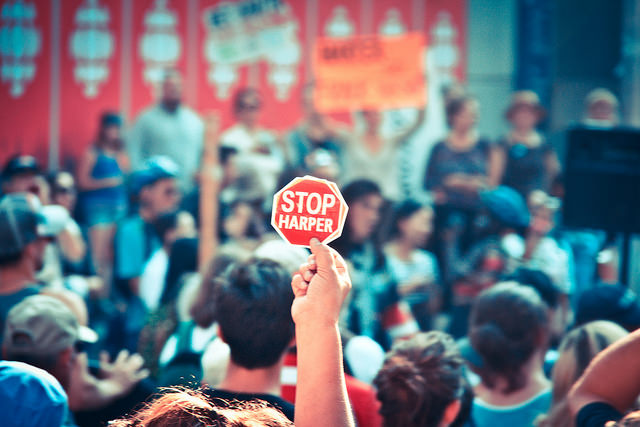Like this article? rabble is reader-supported journalism. Chip in to keep stories like these coming.
Election 2015 has one overriding question: do you want to see another Harper Conservative government?
Two-thirds or more of Canadians are answering: no more Harper.
Some voter choices have already been made. Liberal or NDP partisans support their party and will vote for it. The same goes for Green Party or Bloc Québécois members.
A vote for political party can also be a simple vote for change: throw out the government (See Go Vote for tools available to voters anxious to rid Canada of the Conservatives).
For those who have decided to cast a vote against the Harper government rather than for anyone in particular, the key consideration is voting for the party candidate with the best chance of winning the riding. In this perspective, party platforms, leaders, ideology, approach or past record in office do not matter as much as defeating the Conservatives.
In a Conservative riding, a vote for a candidate with no chance to win in effect becomes a vote for the Conservatives.
In these ridings, voting for change means not voting for the Green Party or any of the other 17 registered small parties.
In identifying the best bet to win a riding, incumbency matters. The New Democratic Party held 95 seats at dissolution of the current parliament, compared to 36 for the Liberals.
Based on current party standings in the House of Commons, voting for the party with the best chance of winning more seats than the Conservatives means voting NDP. That holds for ridings currently held by the NDP, and it holds for the 121 ridings where the NDP came second in 2011 as well.
To form a majority government in the next parliament, a party needs to win 170 seats. This election, 30 new ridings were created, so the Conservatives would need to add to their 166 total from last election in order to secure another majority.
A good way to think about how Canadians vote is by region. Quebec stands apart as a political society, with a tendency to concentrate its vote. The NDP won 59 of 75 seats in Quebec in the last general election of 2011. The party is registering as the choice of nearly 50 per cent of Quebec voters in recent surveys. All remaining Conservative seats are in danger, with the exception of Maxime Bernier in Beauce.
The NDP dominance of Quebec, replacing the Liberals who have lost their historical role as Quebec champion, makes the NDP a better bet than the Liberals to win the most seats overall on October 19. That simple calculation helps the Official Opposition Leader Thomas Mulcair’s campaign.
The secret to Stephen Harper’s win in 2011 was matching its success in the Prairies with a big win in Ontario. Reform party founder Preston Manning of Alberta and tax-cutting Conservative premier of Ontario Mike Harris together provided the Conservatives with the troops and the ammunition for the far-right takeover of Ottawa.
Ontario is the battleground province where the 2015 election will be decided. All three parties have their strengths. Voters looking to back a winning party will be following the national trends not just the local races.
NDP supporters are hoping Ontarians will look to Quebec and vote NDP. Liberals look to re-establish the dominance enjoyed by Jean Chrétien over the province.
In B.C., two-way races between the NDP and Conservatives prevail. This suggests a Quebec-B.C. alliance is the road to a minority government for the NDP, much as Brian Mulroney used an Alberta-Quebec alliance to bolster his two majority wins.
The Conservatives are not a factor in Newfoundland or Prince Edward Island. In the Atlantic provinces, people traditionally inherited their political views. But family loyalties have broken down enough to allow the NDP to challenge the Liberals for seats, particularly in urban areas. Liberals must dominate here to have any chance of winning a plurality of seats.
Races between Liberals and NDP are a feature of downtowns in Toronto, Montreal and Vancouver, where voters in newly re-designed ridings will have a big say in whether it is the NDP or the Liberals that surpasses the Conservatives.
The Conservative heartland is the Prairies. Losses are expected. Liberals look to win new seats in Calgary and Winnipeg, while the NDP expect pick-ups in Edmonton, Lethbridge, Regina, Saskatoon and Winnipeg.
Michael Valpy writes that evidence shows voters who are looking for a change in government also want to see a change in direction for Canada. Trying to reduce risks by running a safe campaign may be a misreading of the mood this election.
The party that looks most ready to break with the recent past will get rewarded on election day by the vote for change.
Duncan Cameron is the president of rabble.ca and writes a weekly column on politics and current affairs.
Photo: Chris Yakimov/flickr
Like this article? rabble is reader-supported journalism. Chip in to keep stories like these coming.



